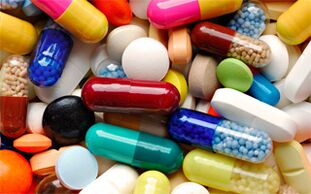
Ways to fight prostate inflammation
- Antibiotics are often prescribed when an illness is caused by a bacterial infection. First, bacterial cultures are used to count the types of bacteria. If the patient is diagnosed with a severe course of the disease, the drug is administered intravenously. A course of antibiotics almost always lasts between one and a month and a half.
However, in some cases, treatment is prolonged to avoid recurrence of the disease. Medications must be taken strictly as prescribed by your doctor. If the cause of prostatitis has not been determined, the treating doctor may prescribe other antibacterial drugs, or a combination of them. - In the area where the prostate and bladder connect, it is often necessary to relax the muscle fibers and bladder neck. Alpha blockers are used for this purpose. These medications will help relieve cramping that occurs during urination. These medications must be taken in proper dosage, but it is best to consult your doctor because alpha blockers have many common side effects, such as low blood pressure and headaches.
- Patients often resort to using painkillers. They often use propionic acid derivatives and acetylsalicylic acid. Taking pain relievers naturally helps cope with painful symptoms, but abusing them can have dire consequences, so you should talk to your doctor about dosage before taking them.
- To reduce the level of proliferation of prostate tissue, hormonal drugs are used. They help reduce testosterone levels, which can lead to unwanted tissue growth. With the help of these medical treatments, you can eliminate inflammation and normalize hormonal levels.
- Patients with severe pain and discomfort in the groin area need to take muscle relaxants. These drugs can affect the perineal muscles, especially the striated muscles. When tension develops in this area, patients can experience very unpleasant sensations and cramps. Muscle relaxants are used to treat pelvic pain and chronic prostatitis.
- Herbal medicines containing natural ingredients are also used. Various plant extracts, essential oils and pollen are part of herbal medicine. Depending on the direction of symptoms, specific treatments are developed. Most often, these medications are pain relievers or relieve swelling and inflammation.
Treatment of various forms of prostatitis
- acute bacterial prostatitis
Pathogens in the acute form are Gram-negative bacteria from Escherichia coli and Pseudomonas, Proteus, Klebsiella and Enterococci. Anaerobic bacteria, chlamydia, Staphylococcus aureus, and Streptococcus faecalis are sometimes found in the discharge of this disease. For this form of prostatitis, antibiotic treatment is necessary. Among these drugs you can find tetracyclines, quinolones or sulfonamides. Men receiving treatment also receive a course of treatment for chlamydial infections if they suspect they contracted the disease through sexual contact. The patient with sepsis was admitted to the hospital and treated with parenteral antibiotics. In this case, doctors prescribe broad-spectrum aminoglycosides and cephalosporins. - chronic bacterial prostatitis
Many antibiotics are unable to penetrate the prostate epithelium when the prostate is inflamed, which is why they don't always work as effectively as we would like. Most commonly, the disease is caused by the presence of Gram-negative organisms, including Ureaplasma urealyticum, Mycoplasma hominis, and Chlamydia trachomatis. Macrolides and tetracyclines are used to treat these infections and must be taken for two weeks. - asymptomatic prostatitis
Prostate-specific antigen testing is performed on patients with asymptomatic (usually chronic) prostatitis. Examination begins after a two-week course of antibiotics. - nonbacterial prostatitis
Numerous studies in this disease area show that chronic pelvic pain syndrome is relieved after a course of antibiotics. It is for this reason that doctors prescribe two weeks of antibiotic treatment even when there is no infection at the time of diagnosis. Some infections tend to respond to medication. In this case, alpha-blockers can be used, which help eliminate the main causes of non-bacterial prostatitis. The cause is an abnormal flow of urine from the urethra to the prostate. When the urethral muscles relax, the pain during urination disappears. A third way to eliminate a patient's disease is to take anti-inflammatory drugs, which suppress the immune system in the prostate tissue that is the cause of the inflammation. In addition, these drugs have additional analgesic properties and have a beneficial effect on lumbar and perineal pain.
Effects of Herbal Preparations
- Extracts from the fruit of the fan palm, available in tablet form, reduce the levels of substances (mediators of the inflammatory process) that cause chronic prostatitis. This medication improves the condition of the prostate by normalizing blood flow.
- The drug contains African plum, which reduces swelling and inflammatory processes in the prostate while stabilizing the function of the cells.
- Additionally, flavonoids (vitamin P) help reduce the activity of anti-inflammatory substances and relax the pelvic floor musculature. After use, swelling and pain will be reduced.
- Chinese herbal tablets that stimulate lymphatic drainage and blood circulation in the prostate can help relieve symptoms of chronic non-bacterial prostatitis. In general, amino acids, phytosterols, glycosides and various minerals have positive effects on the body.
























